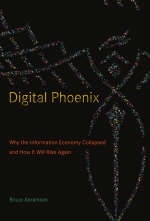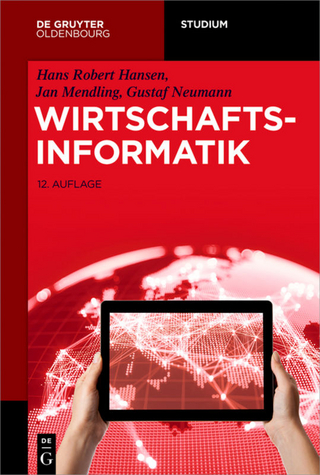
Digital Phoenix
Why the Information Economy Collapsed and How It Will Rise Again
Seiten
2006
MIT Press (Verlag)
978-0-262-51196-4 (ISBN)
MIT Press (Verlag)
978-0-262-51196-4 (ISBN)
- Keine Verlagsinformationen verfügbar
- Artikel merken
How the future of the information economy will take place at the intersection of technology, law, and economics: lessons to be learned from the Microsoft antitrust trial, open-source software, and Napster.
While we were waiting for the Internet to make us rich -- back when we thought all we had to do was to buy lottery tickets called dotcom shares -- we missed the real story of the information economy. That story, says Bruce Abramson in Digital Phoenix, took place at the intersection of technology, law, and economics. It unfolded through Microsoft's manipulation of software markets, through open source projects like Linux, and through the file-sharing adventures that Napster enabled. Linux and Napster in particular exploited newly enabled business models to make information sharing cheap and easy; both systems met strong opposition from entrenched interests intent on preserving their own profits. These scenarios set the stage for the future of the information economy, a future in which each new technology will threaten powerful incumbents -- who will, in turn, fight to retard this "dangerous new direction" of progress.
Disentangling the technological, legal, and economic threads of the story, Abramson argues that the key to the entire information economy -- understanding the past and preparing for the future -- lies in our approach to intellectual property and idea markets. The critical challenge of the information age, he says, is to motivate the creation and dissemination of ideas. After discussing relevant issues in intellectual property and antitrust law, the economics of competition, and artificial intelligence and software engineering, Abramson tells the information economy's formative histories: the Microsoft antitrust trial, the open-source movement, and (in a chapter called "The Computer Ate My Industry") the advent of digital music. Finally, he looks toward the future, examining some ways that intellectual property reform could power economic growth and showing how the information economy will reshape the ways we think about business, employment, society, and public policy -- how the information economy, in fact, can make us all rich, as consumers and producers, if not as investors.
While we were waiting for the Internet to make us rich -- back when we thought all we had to do was to buy lottery tickets called dotcom shares -- we missed the real story of the information economy. That story, says Bruce Abramson in Digital Phoenix, took place at the intersection of technology, law, and economics. It unfolded through Microsoft's manipulation of software markets, through open source projects like Linux, and through the file-sharing adventures that Napster enabled. Linux and Napster in particular exploited newly enabled business models to make information sharing cheap and easy; both systems met strong opposition from entrenched interests intent on preserving their own profits. These scenarios set the stage for the future of the information economy, a future in which each new technology will threaten powerful incumbents -- who will, in turn, fight to retard this "dangerous new direction" of progress.
Disentangling the technological, legal, and economic threads of the story, Abramson argues that the key to the entire information economy -- understanding the past and preparing for the future -- lies in our approach to intellectual property and idea markets. The critical challenge of the information age, he says, is to motivate the creation and dissemination of ideas. After discussing relevant issues in intellectual property and antitrust law, the economics of competition, and artificial intelligence and software engineering, Abramson tells the information economy's formative histories: the Microsoft antitrust trial, the open-source movement, and (in a chapter called "The Computer Ate My Industry") the advent of digital music. Finally, he looks toward the future, examining some ways that intellectual property reform could power economic growth and showing how the information economy will reshape the ways we think about business, employment, society, and public policy -- how the information economy, in fact, can make us all rich, as consumers and producers, if not as investors.
Bruce Abramson received a PhD in computer science from Columbia University and a law degree from the Georgetown University Law Center. He has held positions with the faculties of the University of Southern California and Carnegie Mellon. His consulting and legal practice, based in Washington, DC, focuses on issues related to the digital economy. Abramson is also the author of The Informationist blog, which chronicles "life during the transition from industrial age to information age."
| Erscheint lt. Verlag | 8.9.2006 |
|---|---|
| Verlagsort | Cambridge, Mass. |
| Sprache | englisch |
| Themenwelt | Wirtschaft ► Betriebswirtschaft / Management ► Wirtschaftsinformatik |
| ISBN-10 | 0-262-51196-7 / 0262511967 |
| ISBN-13 | 978-0-262-51196-4 / 9780262511964 |
| Zustand | Neuware |
| Informationen gemäß Produktsicherheitsverordnung (GPSR) | |
| Haben Sie eine Frage zum Produkt? |
Mehr entdecken
aus dem Bereich
aus dem Bereich
Technologische Trends und betriebliche Informationssysteme
Buch | Softcover (2022)
Schäffer-Poeschel (Verlag)
CHF 48,95


